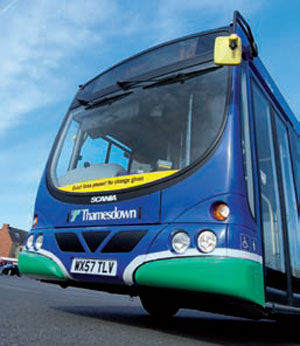
New TAS survey finds revenue falls by up to 6% in real terms, as workforce is cut by over 4%. Revenue trends offer worrying signs for the future
Profits in the UK bus industry fell in 2010/11, bringing to an end a run of three consecutive years of improvement, according to new analysis published this week by TAS Partnership. The 124-page report, Bus Industry Performance 2012 presents the results of its annual analysis of 118 local bus companies around the UK, in what is the 21st year of the firm’s Bus Industry Monitor project.
The report says operators have continued to control costs, with increases well below inflation, but revenue growth was also well below inflation – implying a sharp real-term fall in all the markets outside London.
Turnover across the companies analysed increased by just 1.9%, reaching £5.14bn. Operating costs rose by 2.3% to £4.75bn. Operating profit was £388.7m, 2.3% higher than in 2009/10. Operating margins fell to 7.6% (2009/10: 7.9%, 2008/09: 7.2%).
The fall in profits was mainly driven by sharp reductions in London, and companies outside the capital saw operating profits rise. However, revenue growth was virtually non-existent, as turnover was just 0.3% higher at £3.39bn, while operating costs fell by 0.8% to £3.05bn. Operating profit was 12.4% higher at £335.6m, and operating margins improved to 9.9% (2009/10: 8.8%).
Author Chris Cheek said: “There are worrying signs in these figures, particularly on the revenue front – a 2.2% real-term fall for companies in the deregulated market contrasts sharply with consistent rises across the industry as a whole over the previous five years. In the current economy, it could take years to make this up – especially given the recent cuts in public spending.”
Two Stagecoach companies, Midland Red South, which trades as Stagecoach Midlands (27.8%) and the Busways operation in Tyne & Wear, which trades as Stagecoach North East (23%), were the most profitable companies in the country. Third came municipal Thamesdown Transport – last year’s UK Bus Operator of the Year – on 21.2%. First West Yorkshire came fourth, on 20.6%. Stagecoach also owned the two biggest loss-makers – Islwyn Borough Transport, part of Stagecoach in South Wales (20.2%) and East London Bus & Coach (11.9%), with First following with its Devon & Cornwall company on 9.3% and Glasgow No 2 business on 7.3%.
Looking at operating costs, the document reports on the second successive real-term fall. In nominal terms, costs rose by 2.3% nationally against an inflation rate of around 5%. Measured against the RPI, costs fell by 2.8% in real terms. This came despite an 18% real rise in diesel prices during the year, which meant the workforce bore the brunt of the economies. The total employed by the 118 companies fell by 3.1% (around 3,100 jobs). However, this disguised the fact the companies outside London cut their workforce by 4.6% (3,400) which was then offset by a 300 rise in London. Largest proportional cuts were in Wales (6%), Yorkshire (4.8%), Scotland (4.6%) and the West Midlands (4.3%).
Outside the capital, unit labour costs stayed steady in real terms for the third year in a row, averaging £24,973. In London, unit costs fell back by 0.7%, to stand at £36,558.



